See also
- L'homme armé, a medieval musical motif
- Master-at-arms, a contemporary rank in some navies and armies
A man-at-arms is a type of medieval and Renaissance soldier.
Man-at-arms, or its plural Men-at-arms, may also refer to:
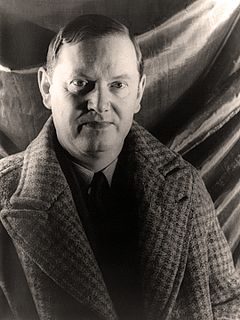
Arthur Evelyn St. John Waugh was an English writer of novels, biographies, and travel books; he was also a prolific journalist and book reviewer. His most famous works include the early satires Decline and Fall (1928) and A Handful of Dust (1934), the novel Brideshead Revisited (1945), and the Second World War trilogy Sword of Honour (1952–1961). He is recognised as one of the great prose stylists of the English language in the 20th century.

The Heart of the Matter (1948) is a novel by English author Graham Greene. The book details a life-changing moral crisis for Henry Scobie. Greene, a former British intelligence officer in Freetown, British Sierra Leone, drew on his experience there. Although Freetown is not mentioned in the novel, Greene confirms the location in his 1980 memoir, Ways of Escape.

Brideshead Revisited, The Sacred & Profane Memories of Captain Charles Ryder is a novel by English writer Evelyn Waugh, first published in 1945. It follows, from the 1920s to the early 1940s, the life and romances of the protagonist Charles Ryder, most especially his friendship with the Flytes, a family of wealthy English Catholics who live in a palatial mansion called Brideshead Castle. Ryder has relationships with two of the Flytes: Sebastian and Julia. The novel explores themes including nostalgia for the age of English aristocracy and Catholicism. A faithful and well-received television adaptation of the novel was produced in an 11-part miniseries by Granada Television in 1981.
Master or masters may refer to:

The Loved One: An Anglo-American Tragedy (1948) is a short, satirical novel by British novelist Evelyn Waugh about the funeral business in Los Angeles, the British expatriate community in Hollywood, and the film industry.

The wild man, wild man of the woods, or woodwose/wodewose is a mythical figure that appears in the art and literature of medieval Europe, comparable to the satyr or faun type in classical mythology and to Silvanus, the Roman god of the woodlands.

A Handful of Dust is a novel by the British writer Evelyn Waugh. First published in 1934, it is often grouped with the author's early, satirical comic novels for which he became famous in the pre-World War II years. Commentators have, however, drawn attention to its serious undertones, and have regarded it as a transitional work pointing towards Waugh's Catholic postwar fiction.

A man-at-arms was a soldier of the High Medieval to Renaissance periods who was typically well-versed in the use of arms and served as a fully armoured heavy cavalryman. A man-at-arms could be a knight, or other nobleman, a member of a knight's or nobleman's retinue, or a mercenary in a company serving under a captain. Such men could serve for pay or through a feudal obligation. The terms knight and man-at-arms are often used interchangeably, but while all knights equipped for war certainly were men-at-arms, not all men-at-arms were knights.

Starting in the Middle Ages, a squire was the shield- or armour-bearer of a knight.
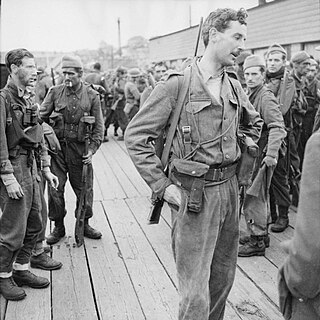
Brigadier Simon Christopher Joseph Fraser, 15th Lord Lovat, 4th Baron Lovat, was the 25th Chief of the Clan Fraser of Lovat and a prominent British Commando during the Second World War. His friends called him Shimi Lovat, an anglicised version of his name in the Scottish Gaelic language. His clan referred to him as MacShimidh, his Gaelic patronym, meaning Son of Simon. Simon is the favoured family name for the Chiefs of Clan Fraser. While the 15th Lord de jure, he was the 17th Lord Lovat de facto, but for the attainder of his Jacobite ancestor who was executed in 1747. He was also 4th Baron Lovat in the Peerage of the United Kingdom.
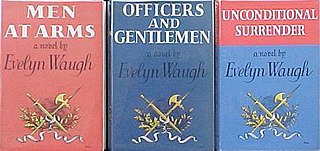
The Sword of Honour is a trilogy of novels by Evelyn Waugh which loosely parallel Waugh's experiences during Second World War. Published by Chapman & Hall from 1952 to 1961, the novels were: Men at Arms (1952); Officers and Gentlemen (1955); and Unconditional Surrender (1961), marketed as The End of the Battle in the United States and Canada.
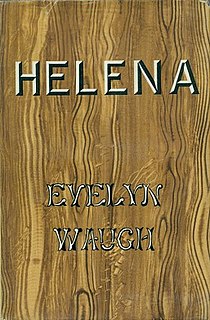
Helena, published in 1950, is the sole historical novel of Evelyn Waugh.
A war novel or military fiction is a novel about war. It is a novel in which the primary action takes place on a battlefield, or in a civilian setting, where the characters are preoccupied with the preparations for, suffering the effects of, or recovering from war. Many war novels are historical novels.

A thieves' guild is a concept in fantasy fiction consisting of a formal association of criminals who participate in theft-related organized crime. Examples appear in the Fafhrd and the Gray Mouser story "Thieves' House" by Fritz Leiber, and role-playing games such as Dungeons & Dragons. Though these more modern works are fictitious, there are real world examples as well, such as Jonathan Wild and his gang of thieves.
A war horse is a horse used for fighting, including light and heavy cavalry, reconnaissance, logistical support, or in individual combat.
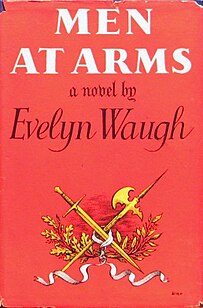
Men at Arms is a 1952 novel by the British novelist Evelyn Waugh.
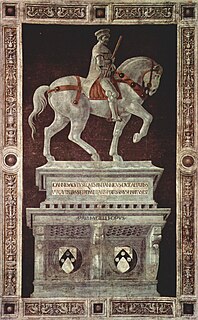
The White Company was a 14th-century English mercenary Company of Adventure, led from its arrival in Italy in 1361 to 1363 by the German Albert Sterz and later by the Englishman John Hawkwood. Although the White Company is the name by which it is popularly known, it was initially called the Great Company of English and Germans and would later often be referred to as the English Company.
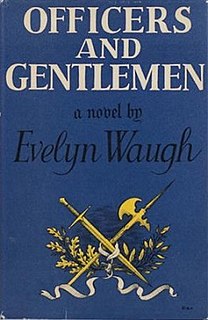
Officers and Gentlemen is a 1955 novel by the British novelist Evelyn Waugh.
Maurice Hugh Keen was a British historian specializing in the Middle Ages. His father had been the Oxford University head of finance and a Fellow of Balliol College, Oxford, and after schooling at Winchester College, Maurice became an undergraduate there in 1954. He was a contemporary and lifelong friend of Tom Bingham, later the Senior Law Lord, as well as of the military historian, Sir John Keegan, whose sister Mary he married.
Iain Gale is a journalist and author born in 1959, who writes military novels. His book Four Days in June, about the Battle of Waterloo, was well received and acclaimed by Bernard Cornwell. He is also the writer of eleven non-fiction books.